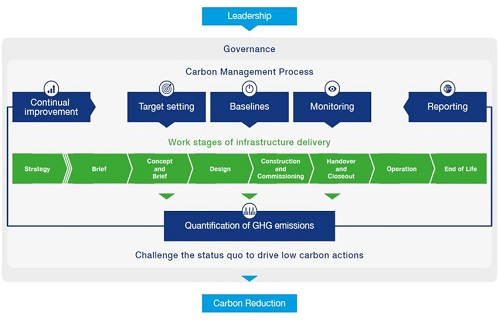The GCB’s Infrastructure Working Group has published a 7 years-on report on the 2013 Infrastructure Carbon Review. We are updating the 2016 PAS2080, a carbon management tool. Both initiatives span the activities around priorities 7 & 8 of Construct Zero. The piece below discusses how the ICR 7 years-on review and PAS2080 support delivery of low carbon in infrastructure projects.
Construct Zero: Measuring and becoming world leaders in designing out carbon in construction projects.
In this piece, we are exploring two of our ConstructZero priorities: Number 7, Implementing carbon measurement, to support our construction projects in making quantifiable decisions to remove carbon; and Number 8, becoming world leaders in designing out carbon, developing the capability of our designers and construction professionals to design in line with circular economy – shifting commercials models to reward measurable carbon reductions.
Our response to the climate emergency requires action and that has been the intent of the Green Construction Board over the last ten years. Through its Infrastructure Working Group carbon leadership and framework tools been developed that are fully aligned with these two priority areas.
In 2013 the group sponsored and guided development of the HM Treasury infrastructure Carbon Review (ICR), promoting actions in leadership, procurement and innovation to drive ‘reduce carbon reduce cost’ solutions. In delivering our construction activity priorities 7 & 8, the messages of the ICR are relevant to leaders of organisations who aim to create the collaborative environment needed and align infrastructure value chains vital to transitioning to low carbon infrastructure to meet society’s future demands.
In 2020 this was followed up by the ICR 7 years on report, which undertook an extensive review of organisations within the UK to gain an understanding of progress against carbon ambitions set in 2013. It gathered some great examples of leadership, collaboration and innovation in organizations in the UK and beyond. It recognises good progress across a number of key areas, including priority 7 (carbon measurement), but stresses that it has not been fast enough. With a strong link to priority 8, this also highlighted that insufficient progress is being made around procurement and commercial contracts and that carbon reductions have often been achieved in silos ignoring the wider infrastructure and built environment system where decarbonisation opportunities are greater. Procurement and systems thinking are key enablers in unlocking low carbon solutions both through the supply chain but also unlocking opportunities at the wider system.
One of the actions of the ICR was the call for a framework for managing whole life carbon in infrastructure. In response, again sponsored by the Green Construction Board and developed through BSI, PAS2080 was launched in 2016, recognised as the only publicly available specification for carbon management in infrastructure. This carbon management tool spans the activities around priorities 7 & 8, providing a framework around managing whole life emissions (construction, operational and user carbon), target-setting, governance, quantification, baselining, monitoring, reporting and continual improvement, including actions required through design and construction gateways.

Reproduced from PAS 2080:2016 by kind permission of BSI
PAS2080 has been adopted by several infrastructure organisations, providing consistency in the measurement and management of carbon and focussing on the importance of early design interventions and behaviours that challenge traditional approaches.
Going forward with support through the Green Construction Board and Institution of Civil Engineers, PAS2080 is now being updated, recognising the momentum that is building to develop zero carbon infrastructure and incorporating nature-based solutions. The scope of the update will be extended to include the wider built environment and its revised content will:
- Ensure alignment to Net Zero and highlight the importance of links to other co-benefits;
- Give more emphasis to systems-thinking;
- Strengthen the importance of managing whole life emissions, especially user carbon which has often been overlooked
- Give greater emphasis on low carbon innovations and what is the role of nature based approaches and retrofit solutions in infrastructure planning
- Revisit the importance of the linkage between reducing carbon and reducing cost;
- Strengthen the need of having better collaborative behaviours and alignment of objectives in the wider value chain through procurement mechanisms and other incentives;
- Refine and simplifying the approach to quantifying carbon emissions and address the need for common data and benchmarking;
- Revisit verification requirements and take account of the varying maturity of organizations
An overarching aim is to improve overall clarity and accessibility for all, thereby encouraging more and more organizations to adopt the PAS2080 framework as the norm for delivering low carbon, sustainable infrastructure fit for a net zero future.
If you want to understand more about the update to PAS2080 then please contact either Clare Price (BSI Sector Lead clare.price@bsigroup.com), Maria Manidaki (Lead Technical Author PAS2080 update maria.manidaki@mottmac.com), Heleni Pantelidou ( heleni.pantelidou@arup.com ) or Adrian Johnson (Chair Technical Advisory Panel PAS2080 adrian.johnson@stantec.com)
Links :
For a copy of PAS2080 carbon management in infrastructure, please visit the BSI website
HMT Infrastructure Carbon Review https://assets.publishing.service.gov.uk/government/uploads/system/uploads/attachment_data/file/260710/infrastructure_carbon_review_251113.pdf
ICR 7 year on report https://www.constructionleadershipcouncil.co.uk/press-releases/good-progress-but-not-fast-enough-decarbonising-infrastructure/
Download this whole news item here.




